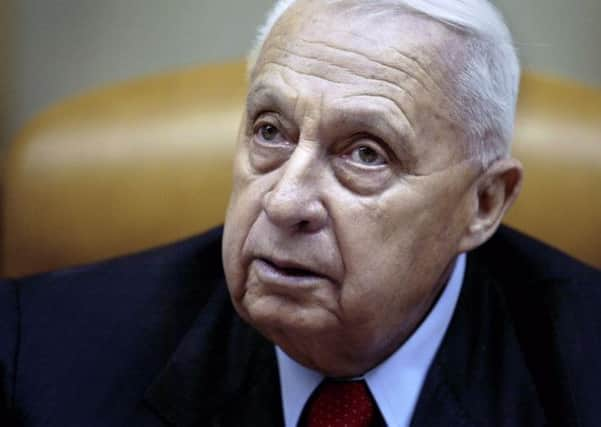Former Israeli prime minister Ariel Sharon dies


Sharon, the warrior-statesman who transformed the region but was reviled by Arab foes over generations of conflict, died yesterday of heart failure. He was 85.
He had been in a coma for the past eight years, and had suffered renal failure at the turn of the year.
Advertisement
Hide AdAdvertisement
Hide AdSharon was first admitted to Sheba Medical Centre, near Tel Aviv, after suffering a massive stroke at the pinnacle of his power as Israeli prime minister in January 2006.
His reputation as an adroit soldier and the godfather of Israel’s settlement campaign in the West Bank and Gaza Strip remain an intricate and divisive part of his legacy.
He was an Israeli army commander during the war of independence in 1948, and a hero of the Six Day War of 1967 and the 1973 Yom Kippur war.
But more than any other event, perhaps, the public perception of the man was shaped by the massacres of up to 3,500 Palestinians and Lebanese Shiites in the Beirut refugee camps of Sabra and Shatila by Christian militiamen allied with Israel during the 1982 invasion of Lebanon that was largely his brainchild as defence minister.
He left major footprints on the Middle East through military invasion, Jewish settlement-building on occupied land the Palestinians seek for a state but also a shock, unilateral decision to withdraw from the Gaza Strip.
“Arik was a valorous soldier and a bold statesman who contributed much to the security and building up of the state of Israel,” said president Shimon Peres, a former ally of Sharon and, with his death, the last of the Jewish state’s founders still in public life.
“Arik loved his people, and his people loved him,” Peres said, using the nickname of the burly and blunt Sharon. “He knew no fear and never feared pursuing a vision.”
Officials said Sharon, who took power in 2001 soon after the start of a second Palestinian uprising that raged until 2005, would be buried after a state funeral to which foreign dignitaries would be invited.
Advertisement
Hide AdAdvertisement
Hide AdPalestinians accused Sharon of sparking their Intifada with a provocative visit to the al-Aqsa mosque in Jerusalem’s Old City. And he embittered many with the Israeli army’s destructive sweep into self-rule areas of the West Bank in 2002 after a spate of Palestinian suicide bombings, and its siege of late Palestinian leader Yasser Arafat in his Ramallah compound.
Arafat’s death on 11 November 2004 in a French hospital, where he was flown after falling ill, remains a subject of controversy, with his widow claiming he was poisoned with radioactive isotope polonium.
Sharon, however, surprised many by withdrawing soldiers and settlers from Gaza in 2005 under a policy of “disengagement” from conflict and a pursuit of dialogue with the Palestinians after Arafat’s demise.
The pullout, however, led to Gaza’s takeover by the Palestinian Islamist Hamas movement which, unlike the West Bank-based Palestinian president Mahmoud Abbas, a former ally of Arafat’s, spurns peace and co-existence with Israel. “We have become more confident in victory with the departure of this tyrant [Sharon],” said Hamas spokesman Sami Abu Zuhri. “Our people today feel extreme happiness at the death and departure of this criminal whose hands were smeared with the blood of our people and the blood of our leaders here and in exile.”
Palestinians in Gaza were handing out sweets to passers-by and motorists in celebration of Sharon’s passing.
A rancher in private life renowned for his big appetite, Sharon became known as “the Bulldozer” partly for his headlong pursuit of hardline policies that included settlement expansion in territory Israel captured in the 1967 Middle East war.
As a young paratroop officer in the 1950s, he championed night-time reprisals – one of which killed dozens of civilians in the village of Qibya – for cross-border Arab guerrilla raids on the fledgling Israel.
He was widely despised by Arabs over the 1982 massacre by Israeli-allied, Lebanese Christian militiamen, which was facilitated by Israeli troops pulling out from around the camps and firing flares to illuminate them during the slaughter.
Advertisement
Hide AdAdvertisement
Hide AdAn Israeli state inquiry found Sharon, who as defence minister engineered Israel’s 1982 invasion of Lebanon and war against Palestinian guerrillas there, indirectly responsible for the killings, and he was forced to resign his post.
His devastating illness set in shortly after he quit the right-wing Likud party and founded a centrist faction with the declared aim of advancing peace with the Palestinians, whose 2000-5 uprising he had battled as prime minister.
Israeli prime minister Benjamin Netanyahu, of Likud, is in peace negotiations with Abbas’s West Bank-based administration, but they are mired in profound differences.